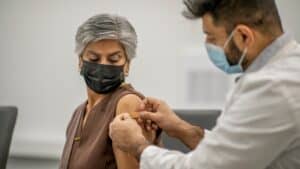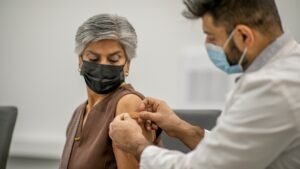
There is really positive and exciting news these days about the expanding availability of a variety of vaccines designed to help protect us from SARS-CoV-2, the virus that causes Covid-19 disease. Many healthcare experts are saying – and we are all hoping – the world may finally be close to turning the corner in combating a disease that disproportionately affects boomers.
If you’re like me, you’re probably following all this news closely. You may have many questions and even some concerns about vaccines in general. There is a good amount of information, sometimes conflicting and confusing, to sort through. Hopefully, I can help you make some sense of it!
I think the best place to start is making sure we have an understanding of what vaccines are, how they work in boomers compared to younger adults, and what we can and should be doing to help vaccines better do the job of protecting our health.
First, Let’s Look at How Vaccines Work
When a pathogen – such as a virus or a bacterium – invades our bodies, it usually draws the attention of our immune systems. Our immune systems then mount a defense against the pathogen in an attempt to neutralize it before it can seriously threaten our health.
Most of the time, we have no idea that our immune systems are busy at work protecting us. A good example of this is how the immune system, in most people, can fight an infection, such as tuberculosis, so well that a person won’t even know they have it.
Other times, however, the immune system has to work a little harder, and we end up having symptoms, such as a fever, until the immune system has successfully conquered the invading pathogen.
When our immune systems are faced with a new pathogen, as is the case with SARS-CoV-2, they literally need to start from scratch in creating all the fighting tools they need to combat it. In the meantime, the pathogen can multiply and wreak havoc in our bodies.
The good news is that the immune system also “remembers” the pathogens it has previously encountered. This means it will usually have the tools (the antibodies we hear so much about) ready to fight them off the next time they invade our bodies.
This is why children tend to have more frequent colds than adults – their immature immune systems are still “learning about and getting to know” all the different cold viruses that are out there. By the time we are adults, our immune systems usually become quite adept at fighting off a wide variety of pathogens.
Now imagine if our bodies could “learn” about a pathogen and be ready to mount a defense against it without having to actually be infected by it. That basically is the idea behind vaccines and how they work.
By introducing a harmless version of the pathogen, or even a little part of it, our immune systems can mount a defense against it and be ready to fight it off should we ever encounter the real thing. This is a good time to mention, by the way, that a vaccine will not give us the disease itself.
We may have a reaction to the vaccine, such as a sore arm if we receive an injection or very mild symptoms, but this just means our immune systems are doing their job!
Efficacy vs Effectiveness
When it comes to protection, you have probably heard – and may have been confused by – doctors talking about “efficacy” versus “effectiveness” as well as “infection” versus “mild disease” and “severe disease.”
This confusion may also be leading you to think “well, I heard that this vaccine is 95 percent effective and this one is 91 percent, so I am going to wait for the more effective one.” Before I share my thoughts on the latter, let me explain that “efficacy” basically means “does it work?” and “effectiveness” is “how well does it work in the real world?”
So, if you are thinking about holding out for 95 percent versus 88 percent, keep in mind that a vaccine would not stop infection. Instead, it helps make sure the immune system can get right to work when the infection happens to reduce, or even eliminate, the probability that we will get sick from it.
In the case of the seasonal flu and Covid-19 vaccines, for example, you may still get sick if you are infected, but you usually won’t get anywhere near as sick as you would have had you not been vaccinated.
This is why, for example, you may hear that a specific Covid-19 vaccine was shown to prevent “severe disease” (usually defined as resulting in hospitalization or death) in a certain percent of the cases.
So, holding out for a vaccine that gives you 95 percent protection versus 88 percent protection is like the difference between going out in the rain with a raincoat versus an umbrella. Both will keep you from getting soaked! If a vaccine will keep me out of the hospital, then that works for me!
Boomers and Vaccines
Many people also have the mistaken idea that a vaccine – or other medicines – somehow create a magic shield that protects them from all disease along with the health consequences of their lifestyle decisions.
In other words, many believe vaccines may somehow absolve us of personal responsibility for our own health or well-being. If you are one of these people, then let me apologize in advance for bursting your bubble. Even with all that modern medicine has to offer, we still need to be proactive when it comes to our health!
Just as taking medicine for cholesterol does not mean you can eat all the French fries you want, taking a vaccine does not mean you can do things that may undercut its effectiveness.
This is especially true for boomers since our bodies do not respond the same way to vaccines as do those of younger people. The difference is that vaccines are usually not as effective with us for two key reasons, both of which are related to our age.
The first is that our immune systems are not as robust as a younger person’s (which is known as immunosenescence), and we tend to have a higher degree of low-grade, chronic inflammation (which is known as inflammaging).
Because of these, the amount of immunity any given vaccine may trigger will probably be weaker, and it may not last as long as it would in someone younger. It is still too early to tell how our being boomers will truly impact the effectiveness of the new Covid-19 vaccines.
With the seasonal flu vaccine, for example, efficacy typically is around 30 percent to 50 percent for us while it is between 70 percent and 90 percent in children and younger adults. But even 50 percent is better than no percent!
In addition to age, our overall health and lifestyle choices can also impact a vaccine’s effectiveness. One concern with the Covid-19 vaccines is that they may not work as well in boomers who are obese (which is about 40 percent of us) since obesity can weaken the immune system.
Another important factor influencing a vaccine’s effectiveness is our nutritional status. Nutritional balance can help bolster how the immune system responds to a vaccine.
What Does All This Mean for Boomers?
Well, while we can’t turn back the clock on age, we can take tangible steps to strengthen our immune systems, reduce any chronic inflammation we may have, work to lose weight if we are overweight, and ensure that we are nutritionally balanced without nutritional deficiencies.
Let’s look briefly at how to address each:
Immune System
Try to reduce stress, quit smoking if you still smoke, make sure you are getting enough vitamin D and zinc, and stay hydrated. Also be sure to talk with your doctor about whether medications you take may impact your immune system.
Chronic Inflammation
One of the primary causes of chronic inflammation is obesity, so it’s important to maintain a healthy weight. Other causes are smoking, chronic stress, and excessive alcohol consumption.
Healthy Weight
Follow a nutrient-rich, primarily plant-based diet, avoid processed foods, drink alcohol in moderation (if at all), and exercise regularly (even walking is great). Make sure to get enough vitamins C and D along with magnesium and zinc.
Nutritional Balance
Start by taking a nutrient test to determine any imbalances or deficiencies. Just as you would to maintain a healthy weight, follow a nutrient-rich, primarily plant-based diet, avoid processed foods, and drink alcohol in moderation.
If you need to supplement, it is also important to only use supplements recommended by a competent healthcare practitioner. Also, be sure to read labels. When the label says, “proprietary blends,” for example, it means you don’t know exactly what is in the product. You may also want to consider IV vitamin drips or injections.
Last, but not least, you should talk with your doctor about any over the counter (OTC) painkillers you may be taking to see if you should discontinue them before getting any vaccines, such as the ones for Covid-19.
The reason for this is that there is some evidence that taking these medications – such as aspirin, ibuprofen, and naproxen – might interfere with the vaccine. The concern is that your body’s immune system may not respond as well as it otherwise would to the vaccine. This, in turn, could reduce its effectiveness.
Have you ever spoken with your health care provider about making sure your vaccines are up to date? Are you planning on getting, or have you already gotten, one of the Covid-19 vaccines? Why or why not? Are you doing what you can to help make sure your vaccines (and other medications) can be as effective as possible? Please join the conversation.





